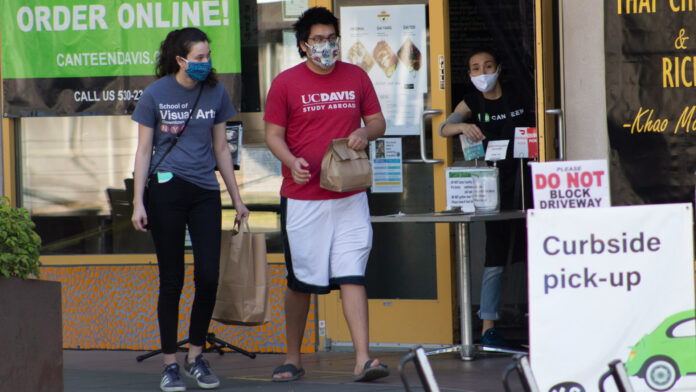Yolo County loosens restrictions for non-essential businesses as California enters stage 2 of COVID-19 response
Yolo County is allowing retail businesses to sell their products through curbside pickup and delivery following California’s transition into stage two of the state’s COVID-19 response. The updates to the county’s shelter-in-place order encompass other parts of the supply chain, including manufacturing and warehouse operations which are opening up again under these guidelines.
In a press release on May 8, Yolo County officials explained how curbside pickup differs from traditional transactions in retail stores.
“Curbside pick-up and delivery allows retailers to resume operations in a modified contactless format where customers can pre-order, pay for items and either pick up items outside the store or have them delivered to their home,” the press release read.
The press release added a list of businesses that are allowed to reopen, which included “clothing stores, bookstores, shoe stores, jewelry stores, home and furnishing stores, sporting good shops, antique stores, music stores, toy stores, and florists.”
County officials stress that this is not a complete reopening of businesses, as retail stores are still required to follow strict social distancing guidelines and adhere to the requirements set forth by the state. The press release continued to explain how California was allowing more variation between counties in their progression through stage 2 of the “Resilience Roadmap”.
“Counties can move further into Phase Two, if they can attest to meeting the State’s criteria by submitting a readiness plan approved by the local health officer and Board of Supervisors,” the press release read. “In preparation for this, Yolo County is developing a draft readiness plan for future review by the Board of Supervisors.”
California’s “Resilience Roadmap” explains the four stages for safely reopening the state during the COVID-19 pandemic. In a press release announcing California’s transition from stage 1 to stage 2, Governor Gavin Newsom explained that though the shelter-in-place order and other public health measures have allowed California to transition to stage 2, the disease has not been fully eliminated.
“It’s critical that businesses and employers understand how they can reduce the risk of transmission and better protect their workers and customers,” Governor Newsom said. “COVID-19 will be present in our communities until there is a vaccine or therapeutic, and it will be up to all of us to change our behavior and eliminate opportunities for the disease to spread.”
For Erin Arnold, the owner of The Avid Reader in downtown Davis, curbside pick-up makes it easier to interact with the local Davis community, who have shown an outpouring of support amid the financial hardships impacting local businesses.
“We’re lucky in that people love books,” Arnold said. “We’ve had a significant cut in our daily sales of books, but we’ve had a constant stream of people frequenting and supporting the store.”
Other sources of relief, like the Downtown Davis’s Business Association’s stimulus program and the Book Industry Charitable Foundation’s emergency grant program, have also helped to alleviate some of the financial burdens from lost revenue. Despite these hardships, employees are staying positive and finding creative ways to reflect a sense of normalcy. For instance, transitioning to curbside pickup has inspired staff to develop new ways for customers to interact with books while still enforcing social distance guidelines.
“We have a table blocking both entrances that are set up with hand sanitizer and a couple [of] books so people can have the experience of browsing,” Arnold said. “I think a lot of people are missing being able to browse and look at books, particularly now that libraries are closed. We wanted to provide a sliver of that experience.”
As for public health measures, staff are required to wear masks and clean their hands frequently with hand sanitizer or by washing their hands. Additional precautions, like bagging books for pick-up and not accepting cash payments, are enforced to protect employees and customers alike.
“We have hand sanitizer that’s CDC-approved on the table so when people hand us their cards, [and] when we hand them back — people can wash their hands,” Arnold said. “We’re putting books in bags which decreases a little bit of the contact. We were contactless payment before this, but once curbside opened, we are now accepting card payment, but we aren’t accepting cash or checks.”
Though the financial effects of curbside pickup are not yet certain, positivity and hopefulness remain as small businesses navigate the current economic crisis with support from local Davis residents.
Written by: Madeleine Payne — city@theaggie.org




